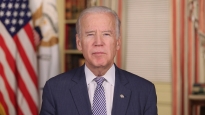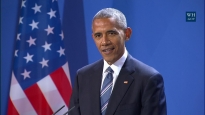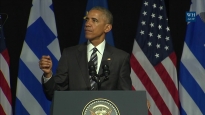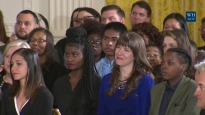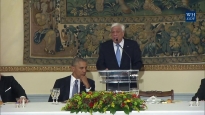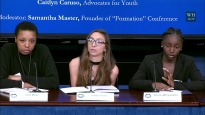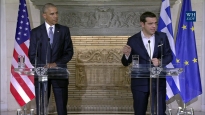President Obama's Bilateral Meeting with NATO Secretary General Rasmussen
May 31, 2013 | 10:55 | Public Domain
President Obama and NATO Secretary General Anders Rasmussen speak to the press after a bilateral meeting in the Oval Office.
Remarks by President Obama and NATO Secretary General Anders Rasmussen After Bilateral Meeting
Oval Office
11:45 A.M. EDT
PRESIDENT OBAMA: It’s a great pleasure once again to welcome our Secretary of NATO, Anders Rasmussen. He has been an extraordinary partner for us and, I believe, a great leader for NATO.
Over the last several years, he has helped to orchestrate a very successful Lisbon summit, a very successful Chicago summit. And, in between, he has been able to mobilize and activate NATO members to take a whole host of actions that have resulted in a more secure world and has helped to underscore the importance of this alliance in the 21st century as a baseline whereby the United States and other member nations achieve security for their people. So I’m very grateful for his extraordinary service.
We had an excellent discussion today focused on a number of issues that are of concern to all NATO members and are of great concern to the United States. Obviously, at the top of our list was Afghanistan, where the international coalition that has worked alongside our U.S. troops has achieved significant progress. And we are now looking over the next several weeks to a new milestone, one that was set in Chicago, where we are transitioning to Afghan lead for combat operations in Afghanistan and NATO members and ISAF members will be shifting into a train, assist, and advise mode.
We’ve seen great progress in the Afghan National Security Forces. We want to continue that progress. And central to that will be those NATO members, who are contributing, continuing to work effectively with their Afghan counterparts so that moving into next year we have a successful Afghan election and we continue transition until the end of 2014 whereby our combat roles will be completed.
We had an opportunity to discuss not only the planning for the next year and a half, but also what kinds of steps we could take post-2014 to continue to ensure that Afghan security forces are effective and can control their own borders, and that NATO members can be assured that Afghanistan will not be used as a base for terrorism in the future.
And what we’ve agreed to is that in order for us facilitate this entire process, that it would be appropriate for us to have another NATO summit next year. And so Secretary Rasmussen will be working diligently, as he always does, to identify a host country and to plan for a 2014 NATO summit, at which time not only will we be able to underscore this final chapter in our Afghan operations, but also to paint a picture of a future whereby we’re partnering with the Afghan government on behalf of the Afghan people and on behalf of world security.
In addition to talking about Afghanistan, we also discussed the importance of continuing to improve NATO defense capabilities in a new world with new threats. And Anders has taken the lead talking with all the NATO members about how we start building up greater and greater capacity and integration that requires burden-sharing on the part of all NATO members. It means that, even during times of austerity, that we work smarter together to ensure that we can meet and are prepared for any threats that may arise, whether it is improving our joint surveillance capabilities or addressing new threats like cybersecurity.
And because of Anders’s leadership, I think we’ve made real progress on this front. One of the goals of a 2014 NATO summit would be to lock in some of the progress that’s already been made into a set of commitments that are clearly understood by all the NATO members, and I very much appreciate the work that Anders has done on that front.
We had a chance to talk about Libya, where we obviously had a very successful NATO operation to liberate Libya from a decades-long dictatorship. We now have a Libyan government that is in a transition process. And part of where we think we can be helpful is to ensure that a democratically elected Libyan government has the capacity to control its borders to ensure that it does not become a safe haven for terrorism. And I think NATO has an important role to play on that front, and I know that Secretary Rasmussen recently met with the Prime Minister of Libya and had discussions about how we could provide assistance.
We are very supportive of those efforts because we think it’s critical that we have strong partners in places like North Africa that are able to meet the security needs of their own people but are also working with the international community to meet the security needs of all of us.
And finally, I congratulated Anders on the excellent work that was done to achieve an agreement with respect to the Kosovo situation that has the potential to be historic and indicates the degree to which NATO forces in that region continue to play a very important role in underwriting the security of people who historically, obviously, have been racked by all sorts of conflict and violence. And we’re very supportive of those efforts.
It’s one more example of the kind of leadership that Secretary Rasmussen has shown during the course of his tenure. We appreciate the fact that he has extended that tenure longer than he and his family originally anticipated, but we’re all very fortunate that he’s taken on this assignment. And I look forward to continuing productive work with him and his entire team at NATO over the next year of his service.
Thank you very much.
SECRETARY RASMUSSEN: Thank you very much, Mr. President for your kind words. Thank you for the support. Thank you for your strong commitment to a strong NATO.
NATO brings together 28 nations that share the same values -- freedom, democracy, the rule of law. And those 28 nations offer a pool of forces and capabilities that is second to none. After almost two decades of operations, our forces are stronger and more experienced than ever. And in these tough economic times, NATO's collective and multilateral defense is far more effective and far more efficient than any individual national capability. Through NATO, you get more value for money -- you get more security for money.
Now, our main operation is our ISAF mission in Afghanistan. Our goal is in sight. Soon, we will reach an important milestone. The Afghans will take the lead for security across the country. Our troops will move into a support role. By the end of 2014, our combat mission will be completed, our combat troops will return home, the Afghan security forces will take full responsibility for the security -- but we will still be there to train, advise, and assist.
And to that end, we are now preparing a training mission to be established from 2015. It will be a very different mission -- a non-combat mission with a significantly lower number of troops and trainers. So we are determinedly moving towards our goal: an Afghanistan that can stand on its own feet. But the Afghans will not stand alone. We are prepared for an enduring partnership with the Afghan people.
As we draw down our operations, we will enhance the modernization of our defense to ensure effective protection of our populations against new and emerging security threats and challenges. That's why we are building a NATO missile defense, strengthening cybersecurity, and we will step up joint military exercises, training, and education to maintain and further develop our ability to work and operate together.
Today, the President and I have discussed this vision of change from a deployed NATO to a prepared NATO. And we look very much forward to further outlining and discussing this shared mission with NATO allies at the summit in 2014.
PRESIDENT OBAMA: Thank you, Secretary.
SECRETARY RASMUSSEN: Thank you.
PRESIDENT OBAMA: Thank you, everybody.
END
11:57 A.M. EDT
|
November 19, 2016
|
November 18, 2016
|
November 17, 2016
|
November 16, 2016
|
|
November 15, 2016
|
November 15, 2016
|
November 15, 2016
|
November 15, 2016
|
- &lsaquo previous
- …
- 7
- 8
- 9
- 10
- 11
- 12
- 13
- 14
- 15
- …
- next &rsaquo
